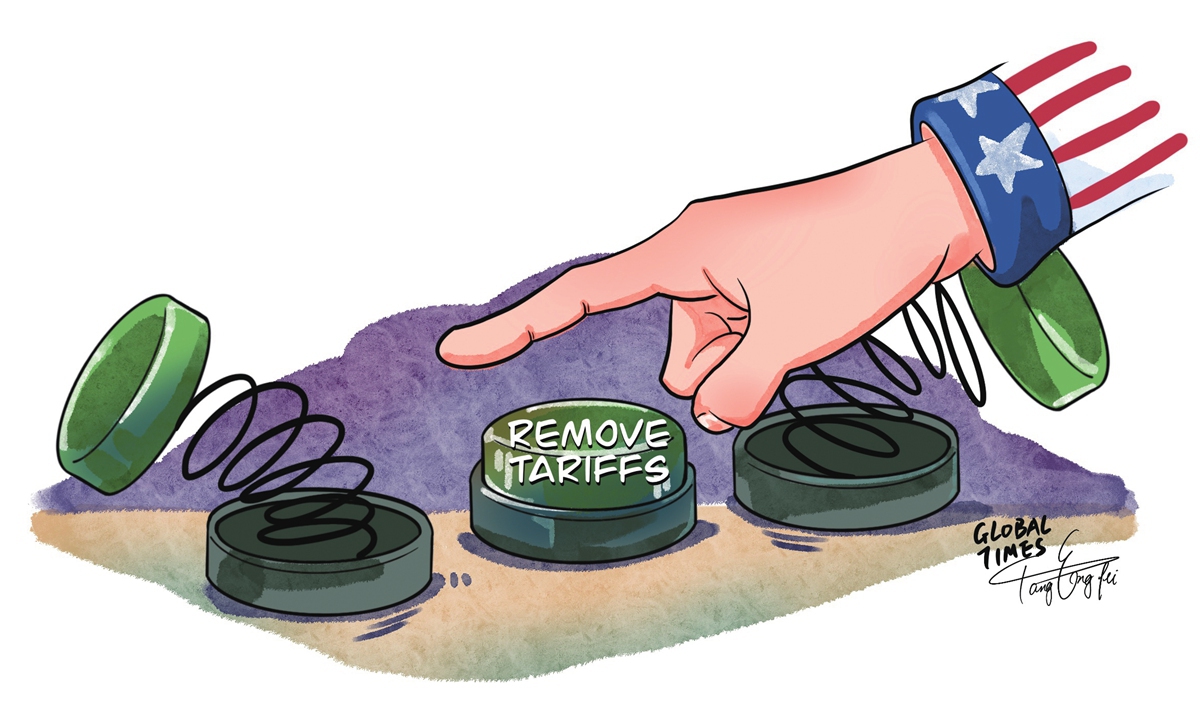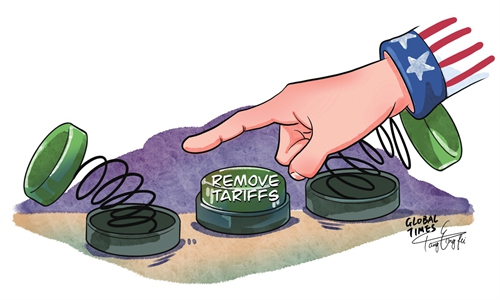
Illustration: Tang Tengfei/Global Times
While the resumption of ministerial talks on China-US trade is a welcome development, a real breakthrough for any substantial improvement in bilateral economic and trade relations would require the US to recognize the failure of the trade war in the first place.The Biden administration is reviewing tariffs imposed on imported goods from China to determine whether some or all of the tariffs should be lifted, Fox Business reported on Monday.
While it is unclear how much impact the development will eventually have on the China-US trade, its timing, which came a few days after Chinese Commerce Minister Wang Wentao's meetings with US Commerce Secretary Gina Raimondo and US Trade Representative Katherine Tai in the US last week, could be a sign of a potential easing of tensions between the two sides.
Statements from China's Commerce Ministry and the US Department of Commerce both indicated that both sides had candid, professional and constructive exchanges on issues relating to China-US economic relationship. Wang expressed concerns about US economic and trade policy toward China, semiconductor policy, and export controls, while Raimondo raised concerns about Chinese actions taken against US companies.
There is no denying that both China and the US have some expectations about future trade talks between the two countries, which is the fundamental motivation behind the resumption of the ministerial dialogue over economic and trade concerns between the two sides. After all, the current trade flows are so large that bilateral trade relationship has already been intertwined with the lives of people on both sides.
According to the US-China Business Council, state economies rely much on doing business with China. California exports $18 billion worth of goods to China, which include industrial machinery, navigational and measuring instruments, semiconductors and components, basic chemicals, and pharmaceuticals and medicines, Yahoo Finance reported. Texas exports $22 billion worth of goods, including oil and gas, basic chemicals, resins and synthetic fibers, miscellaneous crops, and semiconductors and components. It is precisely because the volume is so large that it is still belief that room remains for adjustment and improvement despite the escalating political tensions.
It is still a good thing that both China and the US have the willingness and have taken actions to try to stabilize bilateral economic relations. But it needs to be pointed out that the real breakthrough for China-US trade to resolve their conflicts and differences is that the US must recognize in the first place that the trade war is not the right way to deal with problems facing bilateral trade.
The trade war the US has started since 2018 has proved to be a complete failure in terms of whether its original purposes or results. For both China and the US, no good purposes have been served by US tariffs. Senior US officials such as US Treasury Secretary Janet Yellen said high tariffs on Chinese goods inflicted pain on US businesses and consumers by driving up the costs, contributing to the already high inflation.
Fundamentally speaking, the crux in US-China relations is the US viewing China as its biggest geopolitical challenge, which has led to various US means aimed at suppressing China. In the field of economy and trade, these means include but are not limited to trade war, high-tech containment and "decoupling," and supply chain alliance aiming to "de-risking" trade with China on the grounds of values.
If the US doesn't change its basic strategy of containing China in its economic and trade policy, it will be difficult for bilateral trade to improve in a structured way. The economic concerns China raised in recent meetings with US officials are essentially about the US adjusting its position and approach toward China. Only by ensuring Washington doesn't go down the wrong path will there be possibility for further improving or stabilizing bilateral trade.



